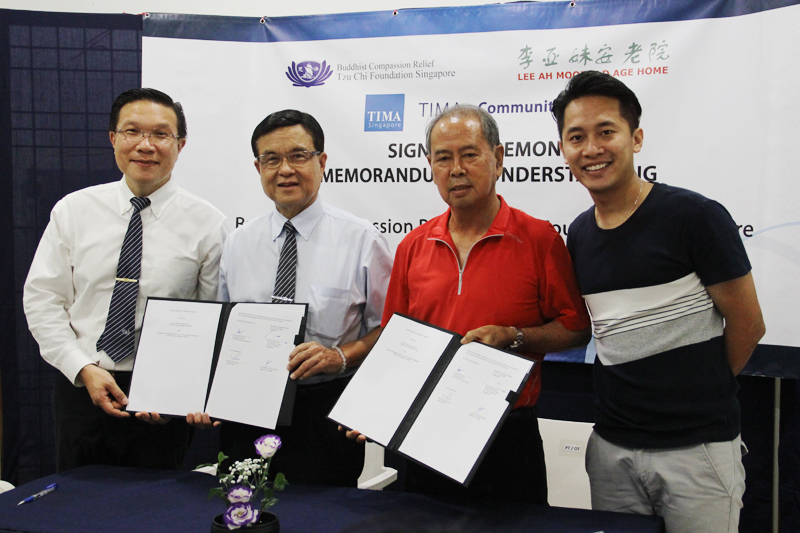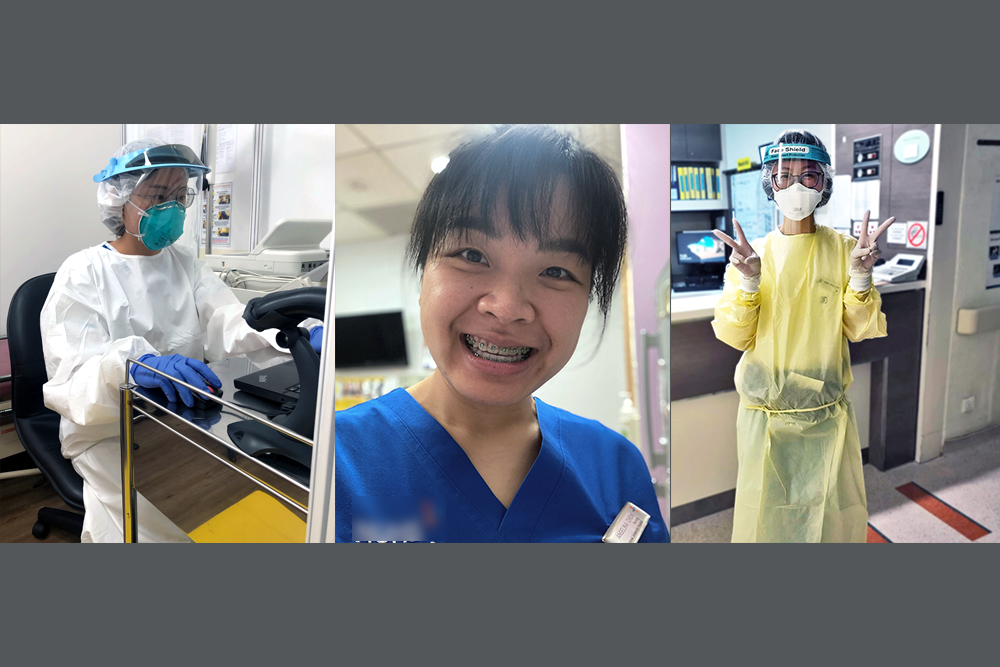
Medical prescription coordinator Xu Hui Juan explains the steps involved in the electronic process, the role of assistants, and the the finer points of medical decorum with respect to Tzu Chi's humanistic culture. (Photo by Li Jia Wen)
Since 2011 when the Tzu Chi Free Clinic started offering five and a half days of outpatient services per week, it has been serving an average of 700 patients a month. During that period, many TCM doctors and herbal pharmacists, as well as medical volunteers, joined its ranks and regularly volunteer their time at the clinic.
With the growth in patient numbers and the increase in new volunteers, the Traditional Chinese Medicine (TCM) department in the Tzu Chi Free Clinic has sought to continually improve its services over the last few years and made a move towards computerization. On 22 February 2014, the department organized a training session focusing on the computerization of the registration and medicine preparation processes which was attended by 61 volunteers.
The doctor in charge of the clinic, Dr. Li Xian Zhong, started off the session by thanking everyone who had made time to attend the training. He shared his hopes that attendees would become more familiar with the improved processes, refresh their memories with what they already know, and together, make the computerization process a success. That day, volunteers with responsibility for the registration and medicine dispensing processes sat through the training in the TCM and Western Medicine departments.
With a view towards environmental conservation and reducing paper wastage, the clinic eschewed the printing of queue number tickets. Referring to the patient appointments that have been scheduled for the day, staff will locate the patients' medical cards, then use them as a form of tracking and reference from scheduling and consultation to the dispensing of medicines. Staff follow the procedure of keying in information into the computer systems and cross-checking them against the clinic's paper records. After more than a year of following this system, in March 2014, the TCM department started looking to simplify the process. Other than for new patients, all other patient records will be electronically recorded, hence the processes for registration and medicine dispensing had to be relooked.
Patient registration is an area of importance; it is also the first contact that patients have with the clinic and experience upfront, the warm and caring manner of volunteers. During normal operations, two volunteers work as a team with one helping to receive the patient while the other takes care of registration details. To facilitate volunteers' understanding during the training, two overhead projectors were set up so that explanatory notes on the registration process could be displayed while another screen showed a visual demonstration of what should be seen during the electronic process.
Volunteers studiously took notes and some even whipped out their smartphones to take reference pictures of what was shown onscreen. With the benefit of 40 minutes of hands-on practice, everyone also had the opportunity to assess their understanding of the information presented.
As the bulk of the patients who come to the Tzu Chi Free Clinic are elderly folks who live nearby, there are some instances whereby patients forget to bring along their identity documents, and some also do not return to the clinic after deciding to adjourn for a meal after registration. In addressing these problems, volunteers Zhou Jing Yuan and Zhong Jia Zhen share their experiences with the rest on addressing the types of situations that could possibly arise. They also advise volunteers to deal with such instances with empathy and tact, ensuring that as far as possible, the efficient operations of the clinic are not compromised.
In addition, due to the computerization of medical records the prescription assistants not only have to ensure the hygiene of their working environment and efficiency of their work processes, it is of great importance for them to dispense the right medicine to the right patient. Prescription coordinators volunteer Xu Hui Juan and staff Lin Zi Shuang explain the steps in the computerization process and even spent some time ingraining the finer points of medical decorum with respect to Tzu Chi's humanistic culture. For example, in the manner of one's dressing and presentation, and how volunteers must adhere to a vegetarian diet on the day that they turn up to serve at the clinic.
At the close of the day's session, volunteers gathered together to watch Master Cheng Yen's teachings in the "Wisdom at Dawn" series. In it, the Master exhorted her disciples to make good use of time and treasure every single day by arising early to receive the Dharma teachings and cultivate wisdom. The two-hour session ended on a fitting note with attendees making sincere prayers that everyone accumulate kind thoughts in their daily lives.

The prescription assistants get a hands-on experience in helping to prepare the patient's medicines. (Photo by Li Jia Wen)

During the training, two overhead projectors were set up so that explanatory notes could be displayed on one screen while a visual demonstration was shown on the other. (Photo by Li Jia Wen)

Volunteers take turns to try out the system; the practical experience enhances their learning. (Photo by Li Jia Wen)



